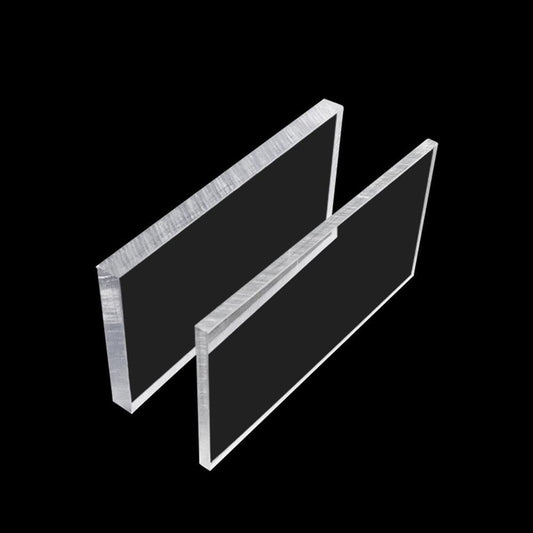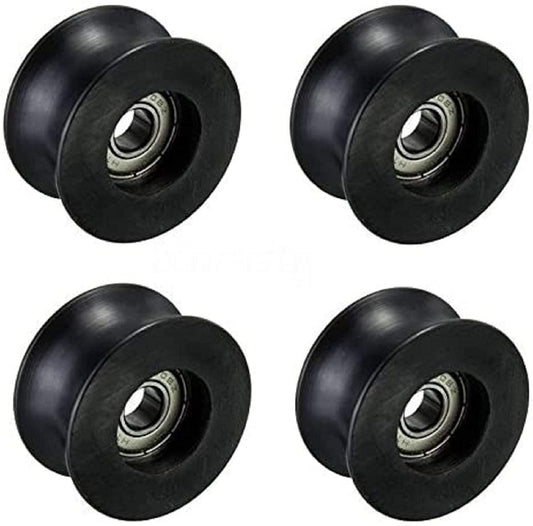Epoxy resin is a foundational material in industrial manufacturing due to its unparalleled versatility and reliability, enabling advancements across multiple industries. For instance, epoxy's role in producing high-performance aerospace components and durable electronic insulators highlights its adaptability and unmatched benefits across industries. From high-performance aerospace components to durable electronic insulators, epoxy demonstrates unmatched adaptability across multiple sectors by excelling in roles that demand precision, durability, and thermal resistance. Its versatility is evident in its ability to replace traditional materials while enhancing performance, whether in cutting-edge electronics or industrial molds. For example, the global epoxy market reached over $10 billion in 2021, driven by its extensive use in industries ranging from aerospace to electronics, showcasing its critical role in modern manufacturing.
🎉🎉🎉Limited Time Offer Use code: QR4GNY08SHVR at checkout and enjoy a special discount on your entire order! 👉 FR4 fiberglass plastic

In this guide, I will delve deeper into the types of epoxy resins that are most suitable for machining, explain the essential tools and techniques, and explore their wide-ranging applications. Along the way, I'll share safety tips and insights to help you select the best epoxy for your specific project needs. Additionally, we'll look at how advancements in epoxy formulations continue to open new possibilities for precision manufacturing.
Understanding the Machinability of Epoxy Resin
Epoxy resins differ significantly in their composition and properties, which directly affect their machinability. Selecting the right type involves evaluating key factors that determine how well the material responds to machining processes. As the demand for customized parts increases, understanding the machinability of epoxy becomes even more critical.
Key Factors Influencing Epoxy Machinability
Understanding these factors is critical for ensuring successful machining outcomes. For example, selecting a heat-resistant epoxy can prevent deformation during high-speed machining, leading to cleaner finishes and more reliable components in industries like aerospace and automotive manufacturing. Each property plays a pivotal role in determining how well epoxy resins respond to cutting, shaping, and finishing processes, ultimately impacting the quality and efficiency of the final product.
-
Hardness and Heat Resistance: Harder epoxy resins resist deformation under cutting forces, allowing for clean and precise results. Their ability to withstand significant heat without softening ensures structural integrity during high-speed machining. For instance, G10 glass epoxy’s high hardness and thermal stability make it ideal for electronics and aerospace applications, where both precision and durability are paramount.
-
Reinforcement: Glass-filled or fiber-reinforced epoxies, such as G10 glass epoxy, offer superior stability and durability. These materials are less prone to cracking or chipping, making them suitable for demanding applications where precision is critical. Glass-filled epoxy is widely used in automotive manufacturing for components that require enhanced strength and resistance to wear under mechanical stress.
Types of Machinable Epoxy Resins
Standard Epoxy Resins
Standard epoxy resins are widely used for light-duty machining tasks. They are effective for producing molds, prototypes, and components that do not require exceptional strength or durability. While they are versatile for general applications, their limitations in high-stress environments mean they may not always be the best choice for industrial projects. These resins often serve as an entry point for manufacturers looking to explore epoxy machining.

Glass-Filled Epoxy
Glass-filled epoxy incorporates fine glass particles to enhance its strength and machinability. In aerospace applications, these particles help create lightweight yet highly durable brackets and panels capable of withstanding extreme conditions. In the automotive industry, glass-filled epoxy ensures precision in manufacturing gears and bushings that demand minimal wear and high performance over time. This combination of reduced tool wear and enhanced part quality makes glass-filled epoxy indispensable in these sectors. These particles improve tool longevity by reducing friction and wear during cutting operations, ensuring consistent performance over extended machining tasks. Additionally, the uniform distribution of stress provided by the glass particles leads to greater precision, resulting in smoother finishes and tighter tolerances, which are critical in aerospace and automotive applications. For example, glass-filled epoxy enables the production of intricate aerospace brackets or precision automotive gears that demand flawless execution and durability.
G10 Glass Epoxy
G10 glass epoxy is a high-pressure fiberglass laminate known for its machinability and exceptional properties. It is extensively utilized in electronics and industrial applications due to its superior thermal stability and mechanical strength. The addition of glass fibers ensures that G10 can withstand rigorous machining processes without compromising its dimensional stability. Its popularity in manufacturing extends to applications such as circuit boards and structural supports, where it consistently meets demanding performance standards.
Tools and Techniques for Effective Epoxy Machining
Machining epoxy requires precision and proper handling to achieve high-quality results. Employing the right tools and techniques ensures efficiency while minimizing risks of material damage. With advancements in machining technology, achieving precision with epoxy has never been more accessible.
Essential Tools for Machining Epoxy
-
CNC Machines: CNC machines offer unparalleled precision, making them the preferred choice for machining intricate designs in epoxy materials. Their programmability ensures consistent results across complex geometries and reduces the likelihood of operator error.
-
Carbide-Tipped Tools: Carbide-tipped tools maintain sharpness for longer periods, providing clean cuts through tough epoxy materials without frequent replacements. This durability makes them indispensable in high-volume production settings.
-
Diamond-Coated Tools: For abrasive composites like G10 glass epoxy, diamond-coated tools provide durability and precision, reducing wear and tear during machining. Their ability to achieve ultra-smooth finishes is particularly valuable in industries like medical equipment manufacturing.
Techniques for Optimized Machining
-
Controlling Heat: Excessive heat can soften epoxy, leading to poor finishes and deformation. Use coolants or adjust cutting speeds and depths to manage heat effectively. Segmenting larger pieces during machining can also help mitigate prolonged heat exposure.
-
Maintaining Consistent Feed Rates: Steady feed rates ensure smooth cuts and minimize the risk of chipping or cracking. Avoid sudden changes in speed or direction to maintain material integrity.
-
Implementing Dust Control Measures: Epoxy machining generates fine dust particles that can pose health hazards. Ensure the use of high-quality dust extraction systems and maintain proper ventilation. Additionally, investing in advanced dust management solutions can improve overall workplace safety.

Industrial Applications of Machined Epoxy
Electronics Manufacturing
In electronics, epoxy components like circuit boards crafted from G10 glass epoxy provide excellent insulation and dimensional stability. These properties are crucial for maintaining performance in demanding environments. Epoxy’s resistance to environmental factors such as moisture and heat makes it a reliable choice for electronic housings and insulators. Its machinability allows manufacturers to achieve precise dimensions, ensuring seamless integration into complex electronic systems.
Mold Making
Epoxy’s ability to hold intricate details makes it a popular choice for mold making. Compared to metals, epoxy molds are lighter, easier to machine, and more cost-effective, reducing overall production costs. Unlike traditional plastics, epoxy offers superior durability and can maintain dimensional accuracy across multiple production cycles, making it ideal for industries requiring high precision, such as automotive and electronics manufacturing. Compared to metals or other traditional materials, epoxy molds are far more cost-effective due to their lower material and machining expenses. Additionally, they require less maintenance, further reducing operational costs. These advantages make epoxy molds a staple in industries like automotive and consumer electronics, where precision and efficiency are paramount. Machined epoxy molds are extensively used in prototyping and plastic manufacturing, offering durability and precision. Unlike metals or traditional plastics, epoxy molds maintain dimensional stability over multiple production cycles, making them cost-effective for high-volume manufacturing. Their ability to capture intricate details ensures superior quality in prototype designs, making them indispensable in industries like automotive and consumer electronics.
Structural Components
Reinforced epoxy materials find applications in aerospace, automotive, and industrial equipment manufacturing. Their lightweight yet durable nature makes them ideal for structural components that require high performance under varying conditions. Epoxy’s resistance to chemical corrosion also makes it a preferred choice for components exposed to harsh environments. Structural parts such as brackets, housings, and enclosures benefit from epoxy’s unique combination of machinability and resilience.
Safety Measures When Machining Epoxy
Machining epoxy can pose risks if proper safety protocols are not followed. Adhering to these measures ensures the safety of workers and the surrounding environment:
Personal Protective Equipment (PPE)
Always wear appropriate PPE, including gloves, safety goggles, and dust masks, to protect against fine epoxy particles that can irritate the skin and respiratory system. For instance, a 2020 study highlighted that prolonged exposure to epoxy dust can increase the risk of chronic respiratory diseases and exacerbate skin conditions like eczema, emphasizing the critical role of PPE in maintaining health and safety.
Ventilation and Dust Control
Use dust extraction systems to minimize airborne particles and maintain adequate ventilation in the workspace. Proper air circulation reduces the risk of inhaling hazardous materials and helps maintain a cleaner work environment. Advanced filtration systems can further enhance safety.
Regular Tool Maintenance
Keep tools in optimal condition through regular inspection and maintenance. Dull tools can lead to poor machining results and increase the risk of accidents. Regular sharpening and cleaning of tools extend their lifespan and ensure consistent performance. Investing in high-quality tools can also reduce long-term costs by minimizing the need for replacements.

Choosing the Right Epoxy for Your Project
Selecting the appropriate epoxy material is vital for achieving desired outcomes in machining projects. Consider the following factors:
Evaluating Application Requirements
Understand the mechanical, thermal, and environmental demands of your project. For instance, G10 glass epoxy is suitable for high-temperature applications requiring robust mechanical strength. Evaluating these factors ensures the material aligns with the project’s performance needs.
Balancing Cost and Performance
Weigh the material’s cost against its performance characteristics to ensure an efficient and budget-friendly solution. Reinforced epoxies may come at a premium, but their durability and stability often justify the investment for long-term projects. Consider how the material’s properties can reduce operational expenses over time.
Seeking Expert Advice
Consult material specialists or manufacturers to identify the best epoxy for your specific needs. Expert input can also help optimize machining parameters for better results. Collaborating with professionals ensures that your project leverages the full potential of epoxy materials.
Unlock Precision with Machinable Epoxy Materials
Machining epoxy is a specialized process that, when executed correctly, can unlock new possibilities in precision manufacturing. Whether you’re working with standard epoxy resins or advanced composites like G10 glass epoxy, understanding their properties and applications ensures the best results for your projects.
Act now to elevate your manufacturing capabilities with the finest machinable epoxy materials available—don’t wait to start improving your processes today! Fill out the contact form at the bottom of the page to discuss your custom requirements. Explore our premium FR4/G10 epoxy glass fiber sheets in our dedicated section for high-performance materials or browse through our extensive range of fiberglass epoxy sheets in our product collection. For a comprehensive overview of our extensive manufacturing capabilities, explore our detailed manufacturing capabilities section. Let’s make your project a success!
🎉🎉🎉Limited Time Offer Use code: QR4GNY08SHVR at checkout and enjoy a special discount on your entire order! 👉 FR4 fiberglass plastic







